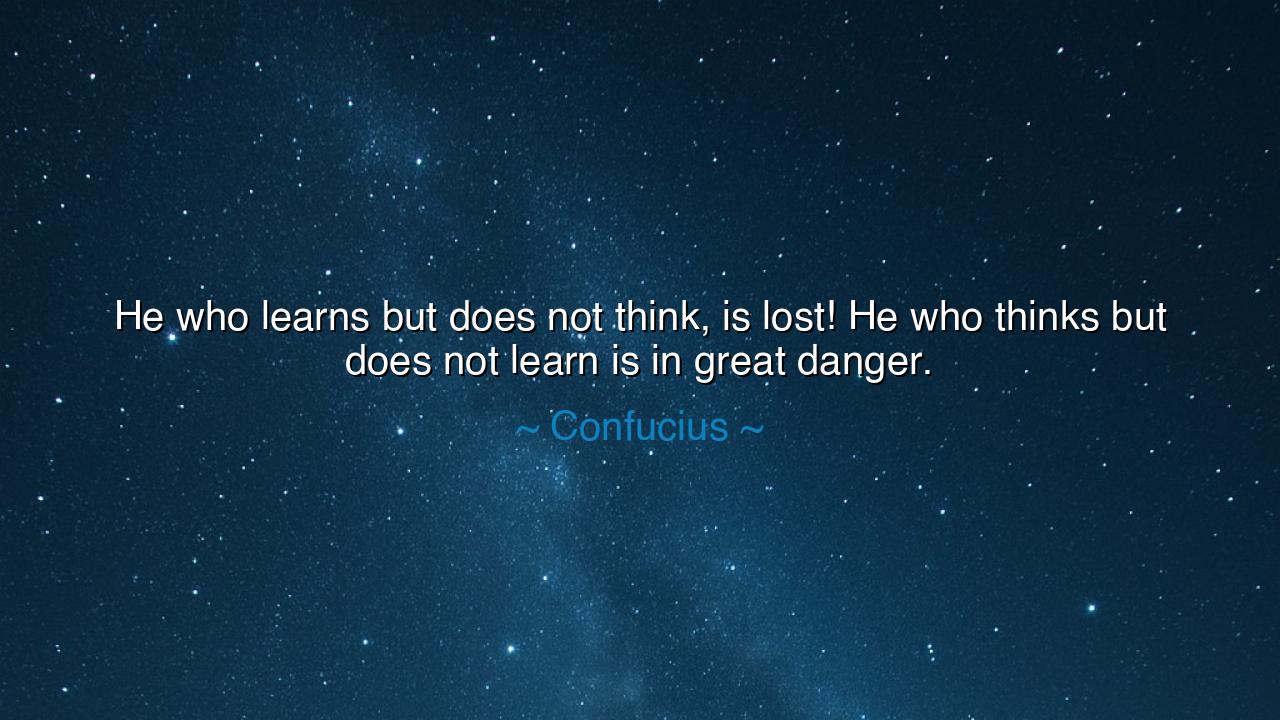
He who learns but does not think, is lost! He who thinks but does
He who learns but does not think, is lost! He who thinks but does not learn is in great danger.






Hearken, O seekers of wisdom, to the eternal words of Confucius, who proclaimed: “He who learns but does not think, is lost! He who thinks but does not learn is in great danger.” In this teaching lies the heart of true understanding: that the mere accumulation of knowledge, untempered by reflection, leads the mind astray, while reflection without the guidance of learning is blind and perilous. Confucius, sage of antiquity, illuminates the delicate balance between learning and contemplation, showing that one without the other leads either to confusion or to folly.
In the lands of old, the scholars of China understood that knowledge is like a sword: it may gleam in brilliance, yet wielded without thought, it cuts its bearer more deeply than the enemy. Likewise, thought untethered from knowledge is like a ship adrift upon storm-tossed seas, guided by imagination alone, destined to crash upon unseen rocks. Confucius’ aphorism warns that wisdom arises only when learning and thinking meet, forging insight capable of guiding both action and understanding.
Consider the life of Sun Tzu, the master of strategy, who studied endlessly the art of war, yet paired every lesson with careful reflection upon terrain, human character, and circumstance. His work, The Art of War, exemplifies the union of learning and thinking. He knew that memorizing tactics without reflection would mislead the general into error, while speculation without knowledge would leave armies vulnerable. In this, we see the eternal truth: to know is not enough; one must apply judgment to knowledge, and to think without study is a perilous gamble.
The ancients of Greece also understood this principle. Socrates, walking the streets of Athens, questioned citizens not to showcase knowledge, but to awaken reflection. He taught that learning must inspire thought, and thought must refine understanding. Those who merely recited texts without contemplation, he warned, were like men wandering through labyrinths with no compass; those who speculated without study were like Icarus, flying boldly yet dangerously close to the sun. Both paths, unbalanced, lead to peril.
Confucius’ teaching also speaks to the dangers of pride. He observes that a mind filled with knowledge but unexamined is lost, for it lacks the humility and insight to discern truth from error. Conversely, a mind that only thinks, yet ignores the lessons of the past, risks calamity, for it builds upon shadows and illusions rather than firm foundations. History offers examples: Napoleon Bonaparte, brilliant and reflective, yet sometimes ignoring lessons from prior campaigns, suffered great loss. Knowledge alone might have guided him, and reflection alone would have failed without the grounding of study.
From this reflection flows a lesson eternal and practical: the pursuit of wisdom demands both learning and contemplation. Absorb knowledge diligently, yet pause to reflect, to question, and to integrate it into understanding. Let study awaken thought, and let thought illuminate what is learned. Only then does knowledge become wisdom, capable of guiding action, shaping character, and illuminating the path of life.
Practical counsel emerges naturally from this truth: read widely, but ponder deeply. Record your observations, ask questions of what you encounter, and seek to apply your learning in judgment and action. Teach others what you have learned, yet always refine it through reflection. In this balance, one avoids the peril of ignorance and the loss of unexamined knowledge, attaining a mind both sharp and profound.
Thus, O listener, let the words of Confucius guide your journey: pursue knowledge with diligence, contemplate with care, and let the union of these forces illuminate your path. For in this harmony lies the essence of wisdom, the safeguard against folly, and the true compass of a life well-lived. Learn, think, and act, and in so doing, walk the road of insight that has guided sages through the ages.






AAdministratorAdministrator
Welcome, honored guests. Please leave a comment, we will respond soon